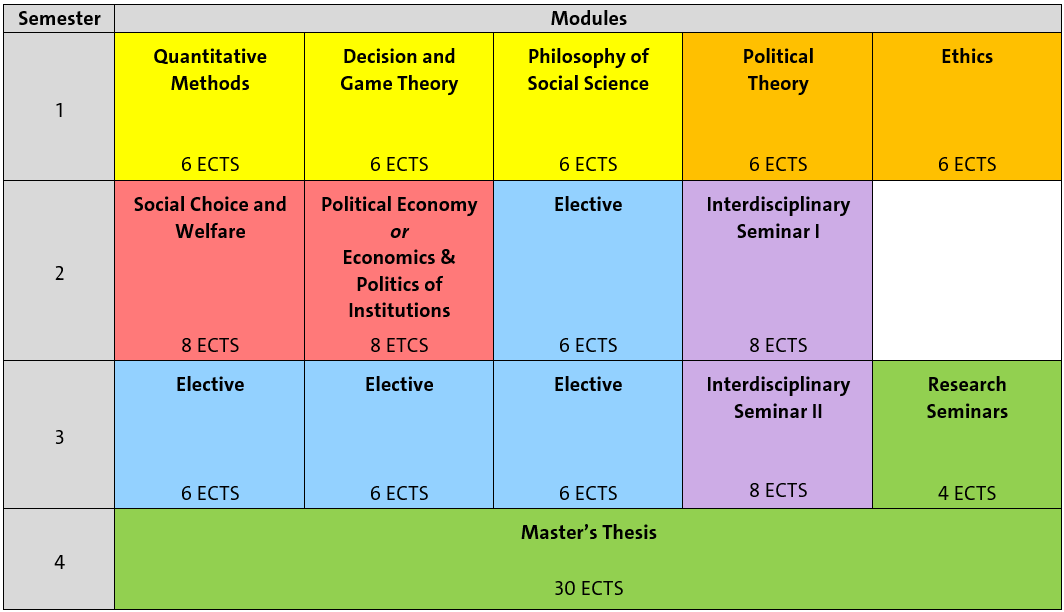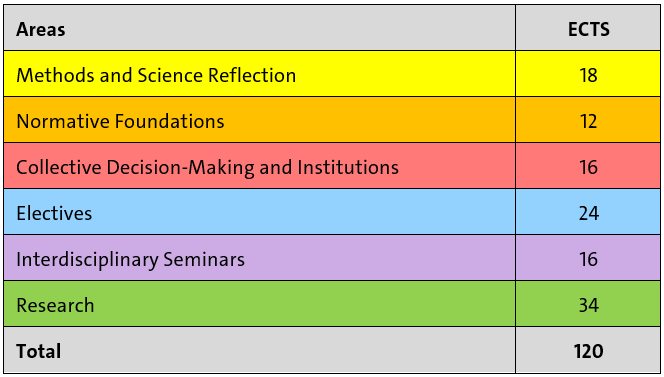Curriculum for students starting as of winter semester 2026/27
The following curriculum applies for students who start their studies in the MSc PEP as of winter semester 2026/27.


Methods and Science Reflection
In this area with the modules "Quantitative Methods," "Decision and Game Theory," and "Philosophy of Social Science," students acquire methodological knowledge for research in the social sciences and they examine the methods and goals of science from a philosophical perspective.
- Quantitative Methods: In this module students acquire in-depth knowledge of selected methods of empirical social research and are able to critically reflect on and apply them in their own projects in line with the current state of research. Students learn to evaluate data independently using basic statistical methods, to implement statistical and econometric models independently using statistical software, to critically reflect on the assumptions of the various methods and apply this knowledge when reviewing results.
- Decision and Game Theory: This course covers the fundamentals of decision theory and game theory. Following an introduction to modeling rational individual decision-making under certainty and under risk, the module will consider strategic interactions and cover the fundamentals of static and dynamic game theory.
- Philosophy of Social Science: The course deals with general questions of the philosophy of science and questions that are particularly relevant to the social sciences. The latter include, for example, questions about the role of values in the social sciences, their status as “genuine” sciences, and the kind of explanations they can provide.
Normative Foundations
This area with the modules "Political Theory" and "Ethics" deals with the normative foundations of individual and social action.
- Political Theory: The course covers the conceptual and practical problems of modern democracy as well as basic concepts of fundamental and human rights, the rule of law, and constitutionalism as articulated in the concepts of legitimacy and authority, justice, freedom, and deliberation. Particular attention is paid to the application of these concepts in the context of collective decision-making. The course also addresses methodological problems, such as the relationship between moral principles and normative political theory, which arise when dealing with basic concepts of political theory.
- Ethics: The course covers topics from the fields of metaethics, normative ethics, and applied ethics (broadly defined). In the field of metaethics, issues such as the realism-anti-realism debate will be addressed. With regard to normative ethics, an overview of the most important deontological and teleological positions will be provided. In the field of applied ethics, particular attention will be paid to issues that are of particular relevance to economics and political science. These include questions of distributive justice and the allocation of rights, freedom, and power.
Collective Decision-Making and Institutions
In this area with the modules "Social Choice and Welfare" and "Political Economy" or "Economics and Politics of Institutions," students apply the knowledge of methods and normative theories acquired in the first semester to analyze collective decisions and democratic institutions.
- Social Choice and Welfare: The course deals with the normative foundations of collective decision-making and voting procedures. The focus is on the question of how a group of individuals, e.g., a society, should aggregate individual preferences in order to take a decision. Key findings on preference aggregation (e.g., the impossibility theorems of Arrow, Sen, and Gibbard-Satterthwaite) are studied in depth. Other topics include the strategic manipulation of collective decision-making procedures and theories of distributive justice.
- Political Economy: The course offers a comprehensive introduction to the field of political economy with a dual focus on substantive topics and methodological approaches. Students will become familiar with the most important debates on how political institutions, economic incentives, and power dynamics shape social and economic outcomes. Using a range of historical and contemporary case studies—from state formation and colonial legacies to global inequality and gender representation—the course encourages students to think critically about the long-term factors that have shaped the current political and economic order. A second goal of the course is to develop students' methodological skills. Through intensive engagement with the research designs used in the literature, students gain a better understanding of how political economy research is conducted, how causal claims are formulated, and how different methodological choices influence the interpretation of results. The interdisciplinary approach, which incorporates both political science and economics perspectives, encourages students to apply the skills they have acquired to their own research projects.
- Economics and Politics of Institutions: Institutions play an important role as both cause and effect in both economics and political science. This course examines the most important theories and research findings on institutions in these two disciplines, with a focus on international institutions. Topics covered include fundamental theories about why institutions arise and what functions they (should) perform, how to assess and explain their effects on behavior and outcomes in a variety of problem areas, including economic development, trade, security, and human rights, as well as aspects of institutional resilience and institutional change, such as path dependency and institutional drift.
Electives
In this area, students freely choose elective courses from the range of course offered in the elective module in order to expand, deepen, and apply the knowledge they have acquired in the compulsory modules. Students can set individual priorities in one of the three sub-disciplines of political science, economics, and philosophy.
Interdisciplinary Seminars
In this area, methods and findings from the three sub-disciplines of political science, economics, and philosophy are applied, combined, and contrasted in relation to specific questions in the context of individual and collective decisions.
- Interdisciplinary Seminar in Politics and Economics: Various themes relating to individual and collective decisions with a focus on integrating the disciplines of political science and economics.
- Interdisciplinary Seminar in Philosophy and Economics: Various themes relating to individual and collective decisions with a focus on integrating the disciplines of philosophy and economics.
- Interdisciplinary Seminar in Philosophy and Politics: Various themes relating to individual and collective decisions with a focus on integrating the disciplines of philosophy and political science.
Research
In this area, students are introduced to current research and they write a master’s thesis. In the module "Research Seminars", students participate in two out of the following three research seminars:
- Hamburg Political Science Seminar Series (HPS³): In this research seminar, nationally and internationally renowned speakers present innovative current research in empirical political science and political economy.
- Microeconomics Seminar: In this research seminar, nationally and internationally renowned speakers present innovative, cutting-edge theoretical, empirical, and experimental research in microeconomics.
- Institutskolloquium: In this research seminar, nationally and internationally renowned speakers present innovative current research in practical and theoretical philosophy.
